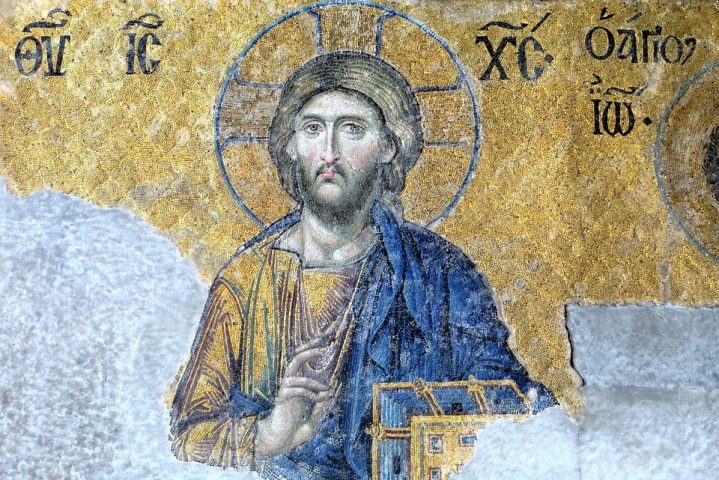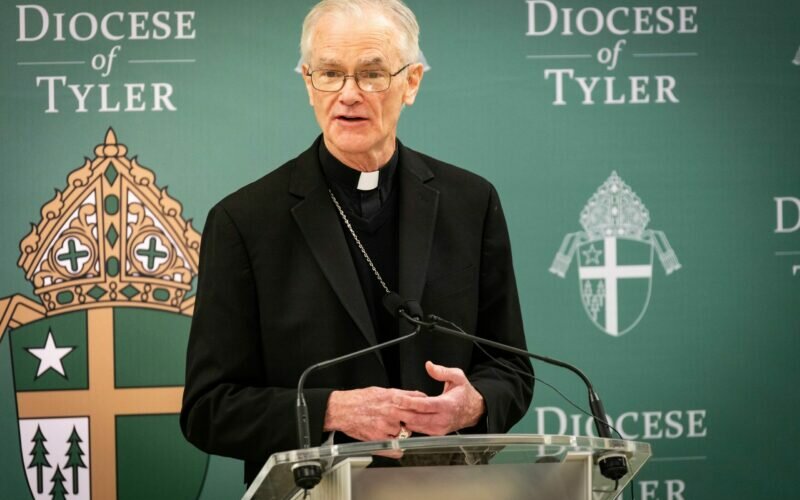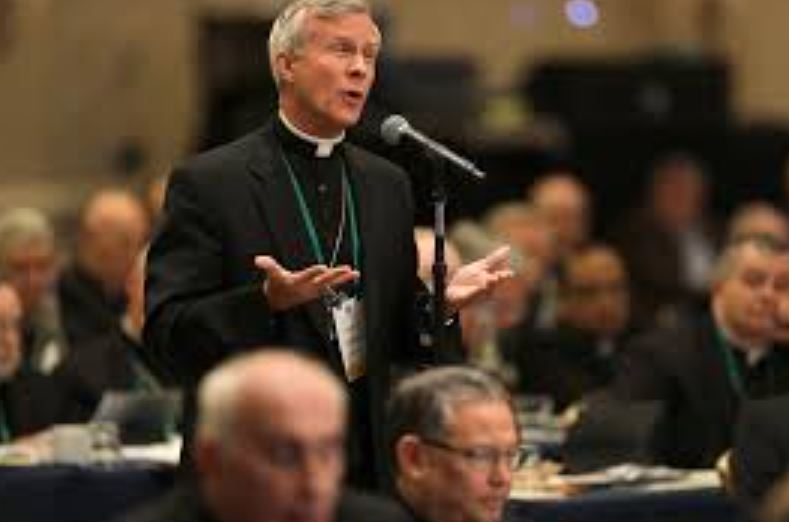Pro-Life Congressman Welcomes Daughter with Down Syndrome; Resigns to Devote Time to His Family, by Micaiah Bilger
October 11, 2019Bishop Robert Barron Seems Squeamish on the Homosexual Question, by Austin Ruse
October 11, 2019
By Msgr. Charles Pope, Oct. 10, 2019
The biblical evidence of Jesus’ divinity is remarkably rich and consistent throughout the New Testament. Although I present many Scripture passages below, I cannot include most of them because doing so would dwarf the rest of the post. Perhaps at some point in the future I will publish a version containing all of the detailed citations. For now, though, let these examples suffice to demonstrate scriptural affirmation of the divinity of Our Lord Jesus Christ.
To begin, recall that the divinity of Christ is a dogma of the Faith (de Fide). The divinity and divine Sonship of Jesus are expressed in all of the creeds. It is perhaps most clearly stated in the Athanasian Creed (Quicumque):
… we believe and confess that Our Lord Jesus Christ is the Son of God. He is God and man. He is God begotten of the substance of the Father before all ages and man born in time of the substance of His Mother. He is Perfect God and perfect man.
Many passages in the Old Testament express the qualities of the coming Messiah:
-
-
a prophet (see Dt 18:15,18)
-
a priest (see Psalm 109:4)
-
a shepherd (see Ez 34:23ff)
-
King and Lord (see Ps 2, Ps 44, Ps 109, Zach 9:9)
-
a suffering servant (see Is 53)
-
the Son of God (see Ps 2:7, 109:3)
-
Emmanuel (God with us) (see Is 7:14, Is 8:8)
-
Wonderful Counselor, Mighty God, Father of the World to Come, Prince of Peace (see Is 9:6)
-
Eternal King (see Dan 7:14)
Many passages in the New Testament ascribe divine qualities to Jesus:
-
-
omnipotence, manifest in the creation and the conservation of the world (see Col 1:15-17, 1 Cor 8:6, Heb 1:2ff)
-
omniscience – In Christ are hidden all the treasures of wisdom and knowledge (Col 2:3).
-
eternity – He is before all things, and in him all things hold together (Col 1:17).
-
immutability (see Heb 1:12, 13:8)
-
adorability (see Phil 2:10, Heb 1:6)
In the New Testament, the Father attests to the divine Sonship of Jesus:
See Mt 3:17, 17:5, Mk 9:7, Lk 3:22, 9:35, Jn 1:34, and 2 Pet 1:17.
In the Gospels, the Lord Jesus gives testimony to His own divinity and self-knowledge. He is of noble stature. He is aware of His dignity and power and expresses it frequently.
Jesus indicates that He transcends the prophets and Kings of the Old Covenant.
-
-
Jonah and Solomon (see Mt 12:41ff, Lk 11:31ff)
-
Moses and Elijah (see Matt 17:3, Mk 9:4, Lk 9:30)
-
King David – See Mt 22:43ff Mk 12:36, Lk 20:42ff
-
He says that the least born into His Kingdom will be greater than John the Baptist who, until that time, was considered the greatest man born of woman (see Mt 11:11, Lk 7:28).
Jesus teaches that He is superior to the angels.
-
-
The angels are His servants and minister to Him (see Mt 4:11, Mk 1:13, Lk 4:13).
-
The angels are His army (see Mt 26:53).
-
The angels will accompany Him at His second coming and do His will (see Mt 16:27, 25:31, Mk 8:38, Lk 9:26).
Jesus appropriates divine actions unto Himself and thus sets forth an assimilation unto the Lord God.
-
-
He declares that it was He who sent the prophets and doctors of the Law (see Mt 23:34, Lk 11:49).
-
He gives the promise of His assistance and grace (see Lk 21:15).
-
He forgives sins, which power belongs to God alone (e.g., Mt 9:2).
-
He, by His own authority, completes and changes some precepts of the Law (See Mt 5:21ff).
-
He declares Himself to be Lord of the Sabbath (see Mt 12:8, Mk 2:28, Lk 6:5, Jn 5:17).
-
Like the Heavenly Father, He makes a covenant with His followers (see Mt 26:28, Mk 14:24, Lk 22:20).
Jesus makes divine demands upon his followers.
-
-
He rebukes some for lack of faith in Him (see Mt 8:10-12, 15:28).
-
He rewards faith in Him (see Mt 8:13, 9:2, 22:29, 15:28, Mk 10:52, Lk 7:50, 17:19).
-
He demands faith in His own person (see Jn 14:1, 5:24, 6:40,47, 8:51, 11:25ff).
-
He teaches that rejection of Him and His teachings will be the standard of final judgement (see Lk 9:26, Mt 11:6).
-
Jesus demands supreme love for Him, which surpasses all earthly loves (see Mt 10:37,39; Lk 17:33).
-
He accepts religious veneration by allowing people to fall at His feet, an honor due to God alone (See Mt 15:25, 8:2, 9:18, 14:33, 28:9,17).
Jesus is well aware of His own power (see Mt 28:18).
-
-
He works many miracles in His own name.
-
He transfers this power to His disciples.
Jesus knows and teaches that His own death will be an adequate atonement for the forgiveness of the sins of the whole human race (see Mt 20:28, 26:28).
Jesus appropriates to Himself the office of Judge of the World, which according to the Old Testament (e.g., Ps 49:1-6) God would exercise (e.g., Mt 16:27). His judgment extends to every idle word (see Mt 12:36) and will be final and executed immediately (see Mt 25:46).
Jesus knows that He is the Son of God.
-
-
Jesus clearly distinguishes His claim in this regard from His disciples’ relationship to the Father. When He speaks of His own relationship with God He says, “My Father.” However, when He addresses the disciples, He calls God “Your Father.” He never unites Himself with them in the formula “Our Father,” thus maintaining a distinction (see Jn 20:17).
-
Jesus first reveals Himself to be the Son of God in the temple, when He remarks to Mary and Joseph that He must be about His Father’s business (see Lk 2:49).
-
Jesus claims to be both Messiah and Son of God in the presence of the Sanhedrin (see Mk 14:62). The Sanhedrin deem this to be blasphemous.
-
Jesus tells a story of Himself in the Parable of the Evil Husbandmen, thus confessing himself to be the only Son of God.
-
Jesus is aware of being one with the Father (The Father and I are one (Jn 10:30,38)). The Jews respond by accusing Him of blasphemy.
In John’s Gospel, Jesus indicates that
-
-
He is eternal (Before Abraham was, I am (Jn 8:58)),
-
He has full knowledge of the Father (see Jn 7:29, 8:55, 10:14ff),
-
He has equal power and efficacy with the Father (see Jn 5:17),
-
He can forgive sins (Jn 8:11 et sicut supra),
-
He is Judge of the World (Jn 5:22,27 et sicut supra),
-
He is rightly to be adored (see Jn 5:23),
-
He is the light of the world (see Jn 8:12),
-
He is the way, the truth, and the light (see Jn 14:6),
-
His disciples may and ought to pray to the Father in His name (see Jn 14:13ff, 16:23ff),
-
His disciples may pray to Him (see Jn 14:13ff, 16:23ff),
-
the solemn confession of the Apostle Thomas, “My Lord and my God,” is acceptable and in fact an act of faith (see Jn 20:28).
Here are a few other New Testament passages on Christ’s divinity:
-
-
And we know that the Son of God is Come and has given us Understanding that we may know the true God and may be in His True Son, this is the True God and Life Eternal (1 John 5:20).
-
In the beginning was the Word and the Word was with God and the Word was God (Jn 1:1-14).
-
Your attitude should be the same as that of Christ Jesus: Who, being in very nature God, did not consider equality with God something to be grasped … and every tongue must confess to the Glory of God the Father that Jesus Christ is Lord (Phil 2:5-11).
-
… to them [the Israelites] belong the patriarchs and of their race, according to the flesh is the Christ, who is God over all blessed forever (Rom 9:5).
-
Looking for the blessed hope and coming of the glory of the great God and our Savior, Jesus Christ (Titus 2:13).
-
But to the Son [God says]: Your Throne, O God is for ever and ever (Heb 1:8).
Well, I hope you get the point. Those who state that Jesus didn’t know He was God or that He never made divine claims haven’t read enough Scripture. Jesus is Lord; He is God. All things came to be through Him, and He holds all creation together in Himself. Those who deny His divinity will one day fall to prostrate before His glory (see Rev. 1:17).
Here is a powerful clip from the movie The Gospel of John. The words you will hear are taken directly from Scripture.







